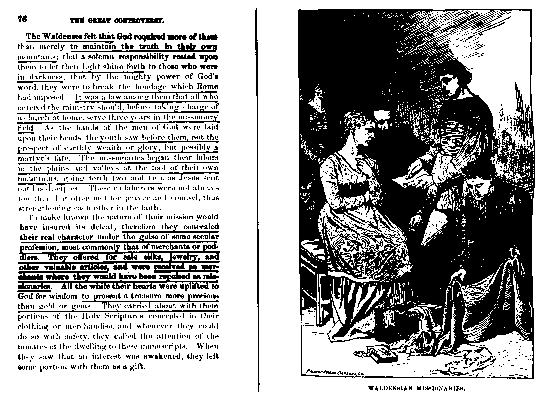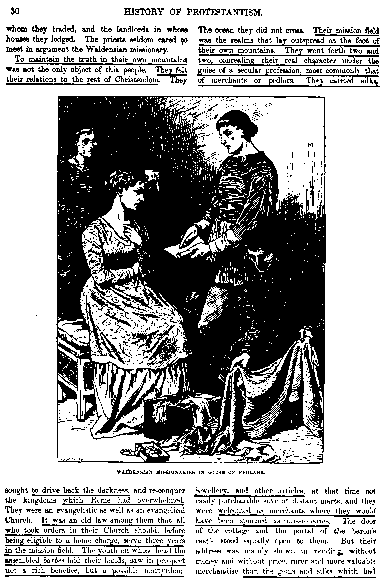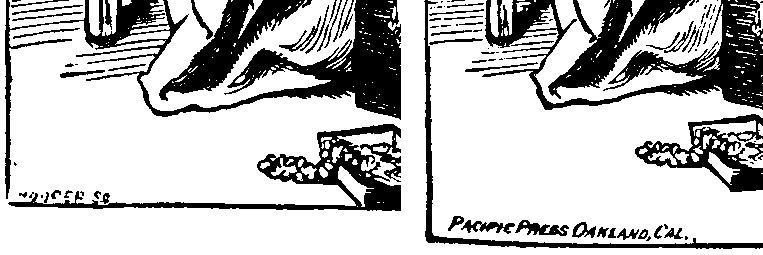Elen Vajt - plagijator
Knjiga "Velika Borba" (1886.) E.G.Vajt sadrži skoro doslovan prepis iz knjige "Istorija Protestantizma" (1876.) g-dina J.A.Vajlija, LL.D. Nisu preuzete samo reči, već i ilustracije, dok je ona tvrdila da je otkrivenje dobila od Boga.
![]() "The History of Protestantism", James A. Wylie, 1876. (svih 24 knjiga).
"The History of Protestantism", James A. Wylie, 1876. (svih 24 knjiga).
![]() "Great
controversy", Ellen G. White, 1886.
"Great
controversy", Ellen G. White, 1886.
![]() "The White Lie", Walter T. Rea (bivši adventistički propovednik, ISBN-0-9607-424-1-7 Izdavač: M&R Publications Box 2056, Turlock, CA 95381. USA)
"The White Lie", Walter T. Rea (bivši adventistički propovednik, ISBN-0-9607-424-1-7 Izdavač: M&R Publications Box 2056, Turlock, CA 95381. USA)
Fotokopija originalnog izdanja "Velike Borbe" E.G.Vajt (Izdanje iz 1886. strane 76-77)

![]() "The Waldenses" (Poglavlje 4) str. 70-71
"The Waldenses" (Poglavlje 4) str. 70-71
Prepisani delovi teksta su podvučeni
Fotokopija originalnog izdanja "Istorije protestantizma" J. A. Vajli, LL.D. (Izdanje 1876.)

![]() "The History of Protestantism (The Waldenses - Their Missions And Martyrdoms)" (Poglavlje 7)
"The History of Protestantism (The Waldenses - Their Missions And Martyrdoms)" (Poglavlje 7)
Prepisani delovi teksta su podvučeni
Ovo je knjiga iz koje je Elen Vajt prepisivala, tvrdeći da je otkrivenje dobila od Boga
Donji levi delovi ilustracija su dati uveličano:

Jedan primer plagijata Vajlija od strane Elen Vajt je istaknut u nastavku:
| E.G.Vajt "Velika borba" [Izdanje 1962, str. 58] |
Elen Vajt "Velika borba" [Izdanje 1886.] |
J.A.Vajli, LL.D. "Istorija protestantizma" [1876] |
|---|---|---|
| Oni su osećali da Gospod očekuje od njih nešto više negoli da samo sačuvaju čistu istinu o svojoj crkvi. Na njima je počivala ozbiljna odgovornost da svetlost istine zasija i među onima koji su bili u tami. Moćnom silom Božje Reči nastojali su da raskinu lance koje je Rim svima nametnuo. Valdenžanski propovednici spremali su se za misionarsku službu. Svaki koji je nameravao da stupi u propovedničku službu morao je najpre da stekne iskustvo kao evanđelist. Svaki je morao da služi tri godine u nekom misionarskom polju pre nego što je mogao da primi službu u nekoj crkvi u domovini. Ova služba, koja je već u samom početku zahtevala samoodricanje i žrtve, bila je podesna priprema za propovednički poziv u onim teškim vremenima iskušenja. Mladići koji su se posvetili ovoj svetoj službi, nisu imali pred sobom izgled na zemaljsko blago i čast, već život rada i opasnosti a možda i mučeničku smrt. Misionari su odlazili dva po dva, kao što je Isus slao svoje učenike. Sa svakim mladim obično je išao jedan stariji i iskusniji pratilac, koji je služio kao vođa mlađemu, koji je bio odgovoran za njegov odgoj i kome se mladi morao pokoravati. Ovi saradnici nisu uvek bili zajedno, ali su se često sastajali na molitvu i savetovanje, i tako su se međusobno jačali u veri. Otkriti cilj svoje misije značilo bi prouzrokovati sopstveni poraz. Zato su oni pažljivo prikrivali svoj pravi zadatak. Svaki propovednik je znao neki zanat i imao neko zanimanje; ovi misionari su obavljali svoj rad pod plaštem nekog svetovnog poziva. Obično su dolazili kao trgovci ili pokućari. Prodavali su svilu, nakit i druge predmete koji su se mogli nabaviti samo u najudaljenijim centrima, i kao trgovci bili su dobro primljeni i tamo gde bi kao misionari bili oterani. Bez prestanka su podizali srca Bogu, tražeći potrebnu mudrost da bi mogli otkriti prepis Biblije u celini ili u delovima, i gde god bi se pružila prilika, obraćali su pažnju svojih kupaca na ove rukopise. Često su na taj način probudili interesovanje za čitanje Božje reči i rado su ostavljali poneki deo Biblije onima koji su to želeli. | Valdenžani su osećali da Bog od njih zahteva više nego samo da sačuvaju istinu u svojim gorama; da na njima počiva svečana odgovornost da svetlost istine zasija onima koji su bili u tami; da silnom snagom Božje reči trebaju da raskinu ropstvo koje je Rim nametnuo. Među njima je bio zakon da svako ko stupi u propovedničku službu mora, pre nego što preuzme crkvu kod kuće, služiti tri godine u misionarskom polju. Dok su ruke Božjih ljudi polagane na njihove glave, mladići su pred sobom videli, ne izglede na zemaljsko bogatstvo ili slavu, već možda mučeničku sudbinu. Misionari su započeli svoj rad u ravnicama i dolinama u podnožju svojih gora, odlazeći dva po dva, kao što je Isus slao svoje učenike. Ovi saradnici nisu uvek bili zajedno, ali su se često sastajali radi molitve i savetovanja, jačajući tako jedni druge u veri. Obznanjivanje prirode njihove misije osiguralo bi njen poraz; zato su prikrivali svoj pravi karakter pod plaštem nekog svetovnog poziva, najčešće kao trgovci ili pokućari. Nudili su na prodaju svilu, nakit i druge dragocene predmete, i bili su primljeni kao trgovci tamo gde bi bili odbijeni kao misionari. Sve vreme njihova srca su bila uzdignuta Bogu za mudrost da predstave blago dragocenije od zlata ili dragulja. Sa sobom su nosili delove Svetog pisma skrivene u svojoj odeći ili robi, i kad god su to mogli bezbedno da učine, skretali su pažnju ukućana na ove rukopise. Kada bi videli da je interesovanje probuđeno, ostavljali bi im neki deo kao poklon. | S kojima su trgovali, i kod stanodavaca u čijim su kućama boravili. Sveštenici su retko uspevali da se nose u raspravi sa valdenžanskim misionarom. Da sačuvaju istinu u svojim gorama nije bio jedini cilj ovog naroda. Osećali su svoju povezanost sa ostatkom hrišćanskog sveta. Nastojali su da suzbiju tamu i ponovo osvoje carstva koja je Rim preplavio. Oni su bili evangelizaciona isto koliko i evanđeoska crkva. Bio je to stari zakon među njima da svi koji prime čin u njihovoj crkvi moraju, pre nego što steknu pravo na službu kod kuće, služiti tri godine u misionarskom polju. Mladić na čiju su glavu okupljene brade položile ruke, video je u izgledu ne bogatu parohiju, već moguće mučeništvo. Okean nisu prelazili. Njihovo misionarsko polje bila su carstva prostrta u podnožju njihovih gora. Odlazili su dva po dva, prikrivali svoj pravi karakter pod plaštem svetovnog poziva, najčešće kao trgovci ili pokućari. Nosili su svilu, nakit i druge predmete, koji se u to vreme nisu lako mogli kupiti osim na udaljenim trgovima, i bili su dobrodošli kao trgovci tamo gde bi bili prezreni kao misionari. Vrata kolibe i kapija vlastelinskog dvorca stajala su im podjednako otvorena. Ali njihova veština se uglavnom ogledala u prodaji, bez novca i bez plate, ređe i vrednije robe nego što su bili dragulji i svila koji su..." |
